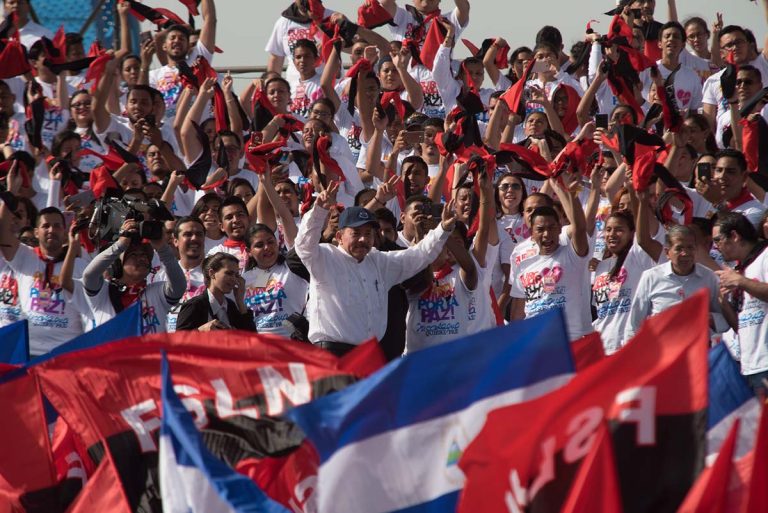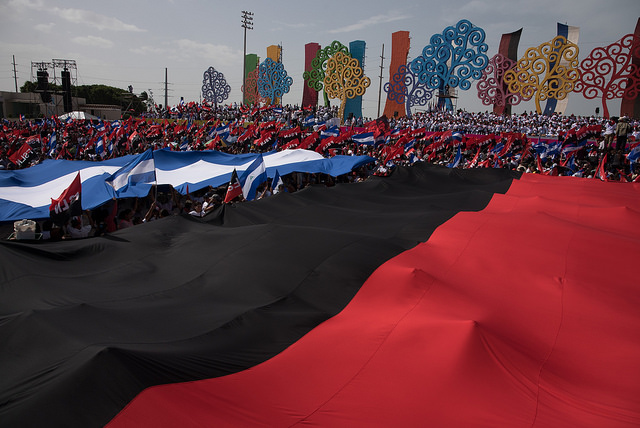22 de julio 2018

Children of Exile: The Births “Sowing Hope” in the Camp of Nicaraguan Farmers

PUBLICIDAD 1M
PUBLICIDAD 4D
PUBLICIDAD 5D
They may be the leaders of a sect, but they’ll never be able to govern a free and indomitable nation such as Nicaragua.

Daniel Ortega arriving at the Plaza on July 19th. Photo: Carlos Herrera / Confidencial
How do we respond to a president who declares war against all those that oppose him?
A president who has demonstrated his willingness to use arms, to persecute and condemn as “terrorists” those who dare to contradict the version of reality he’s been fostering to explain what has happened in the country.
Daniel Ortega’s speech [on July 19th], dividing the population into Sandinistas and terrorists, is an a priori condemnation of any acts of protest against his government. To classify hundreds of thousands of Nicaraguans as coup plotters, rightists and members of a conspiracy hatched by outside forces, all because they’ve gone out onto the streets to demand the resignation of those they consider responsible for their dead, is to put us all up against the wall with our hands up.
“Hands up”, or you die; or you end up in the El Chipotejail with no legal recourse to defend yourself. The judges who want to hear both sides are thrown out, and the accused are not being allowed their own lawyer. Instead, a public defender is named for them at the government’s discretion. The sentences that Nicaraguans accused of participating in the protests are receiving are agreed upon beforehand, with punishments of up to 20 years.
From a statesman with the clarity of mind to understand that he’s governing over all and not only those who follow him with fervor, we would have expected a thoughtful speech on July 19th, one that accepted that the reconciliation he preaches must start by not converting the social explosion that took place into a conspiracy. He had it in his power to extend an olive branch of peace, but we’ve already seen how difficult that is for him.
I don’t know if I understood well, but I believe he declared an end to the dialogue by accusing the bishops of being “Coup plotters”. The attack on the Church – which as a Catholic he’s obligated to respect – was surprising. Since Zelaya expelled the Jesuits [in 1881], I believe there’s never been such a resounding condemnation of the Catholic Church here. Ortega ignored completely the conciliatory and humanitarian role of the priests who have intervened to save lives. Obviously, those lives don’t count in this country. Classifying protestors as “terrorists” appears to give the state the license to kill them, as if it was a matter of enemies in wartime. It’s strange that he who professes to be a Catholic and to invoke God, doesn’t think to use more measured language. However, in the end, this is the ruler we have.
So, it came to pass that this 39th anniversary of the revolution was celebrated on top of hundreds of cadavers and with the jails full. The declaration of “victory” was charged with aggressiveness. In front of his supporters, Ortega and Murillo continued the terrible, bellicose practice of dehumanizing those they perceive as enemies. They refused to accept the authentic humanity of that enormous quantity of people from all the country’s towns and cities and from all sectors of society who demonstrated in these last three months. Instead, they incited their followers to see them – not as people – but as demons, authors of satanic rites, children of Satan.

Photo by Carlos Herrera | Confidencial
How can that be called a search for peace? It’s just the opposite. It’s a dangerous appeal to the most primitive instincts of their loyal followers, offering them free rein to their hostility and a guarantee of impunity to attack that part of the population that they’ve called “terrorists” for the crime of condemning the repression and demanding an end to authoritarianism and a return to democracy.
The leaders have tacitly accepted the fact that there are a lot of them. That’s the backdrop to their proclaiming the installation of “self-defense forces”, in other words the institutionalization of the armed paramilitaries. That’s the backdrop for Daniel Ortega calling on his followers not to promote peace, but to “defend it” from the “satanic sects”, as he has classified a large part of his own people. It’s all too clear what this means.
The Sandinistas of the past accepted the Sapoaagreements, [1988 ceasefire between the Sandinistasand the “contra”]. The reconciliation that took place in this country following the war of the 80s was astounding, despite the many obstacles and blunders that were committed. But back then there was a Party and a collective leadership that served as a counterweight and dampened the urge for revenge within its ranks. There was also an unpretentious woman president who had the courage to reconcile with her sworn enemies. Now, the panorama is different.
We have before us a couple whose benevolence was dropped at the first crisis. A couple who in their absolute control of power didn’t weigh the results of the huge gap between their words and their actions; didn’t weigh how their authoritarian practices were strangling a people that had already paid an enormous price for freedom and weren’t willing to give it up in exchange for panels of tin roofing, pigs, chickens and parks.
It’s a shame that they don’t value the people they have. It’s a shame that, instead of listening to them, they opt to stigmatize them and silence them at any cost. With their ruinous strategy, they’ve revealed that they can lead a sect but that they lack the wisdom and compassion needed to govern a free and indomitable nation such as Nicaragua.
Archivado como:
PUBLICIDAD 3M
Poeta y novelista nicaragüense. Ha publicado quince libros de poemas, ocho novelas, dos libros de ensayos, una memoria, y cuatro cuentos para niños. Su primera novela “La mujer habitada” (1988) ha sido traducida a más de catorce idiomas. Ganadora del Premio La Otra Orilla, 2010; Biblioteca Breve, de Seix Barral (España, 2008); Premio Casa de las Américas, en Cuba; Premio Internacional de Poesía Generación del ‘27, en España y Premio Anna Seghers de la Academia de Artes, de Alemania; Premio de Bellas Artes de Francia, 2014. En 2023 obtuvo el premio Reina Sofía de Poesía Iberoamericana, el más prestigioso para la poesía en español. Por sus posiciones críticas al Gobierno de Daniel Ortega y Rosario Murillo, fue despatriada y confiscada. Está exiliada en Madrid.
PUBLICIDAD 3D